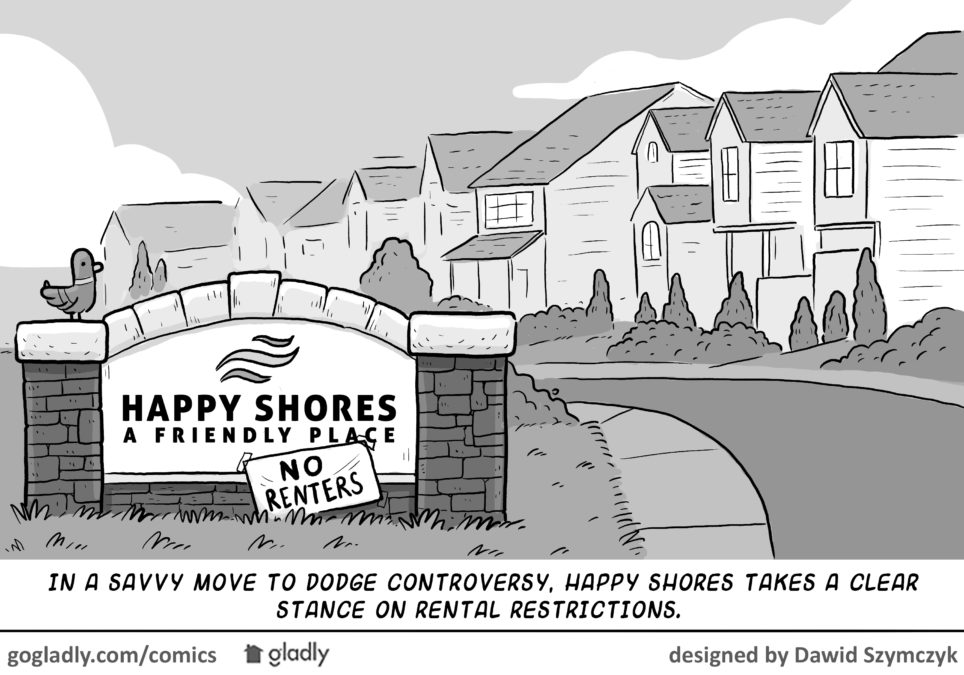Property owners and HOA renters occasionally both agree that homeowners associations put unnecessary rental restrictions in place. On the other hand, many homeowners also believe that the homeowners association has their best interest at heart, and works hard to protect them through valuable and appropriate CC&Rs.
In some cases, the homeowners association may prevent you from renting your unit for a few pertinent reasons — even if you don’t agree. But the truth is, they have strict policies in place to make sure all residents live up to the standards expected of everyone in the community. Ideally, those standards are for everybody’s benefit.
That said, there are some good, bad, and downright ugly things about rental restriction policies. Let’s take a closer look.
Positive Aspects of HOA Rental Restriction Policies
When a homeowners association puts rental restrictions in place, it is for the safety and protection of homeowners. Contrary to what some may think, HOA’s don’t institute these policies to make anyone’s lives difficult. In reality, there are many benefits to rental restrictions. Homeowners may not always recognize them, but here are just a few.
Rental Ratios
High rental ratios can have a negative impact on home marketability, even making it harder for future buyers to qualify for financing. For example, if community rentals exceed a certain ratio, the neighborhood may look less stable to potential financiers. Also, for right or wrong, the assumption is that renters typically do not maintain a property as well as a homeowner, and many homeowners may feel like their property values are being driven lower when they see more renters moving in. Many HOAs restrict rentals to keep the ratios down and boost homeowner (and public) perception of value.
CC&R Violations
Rental restrictions may help protect a community against increased violation of CC&Rs. Remember, if an outsider sublets a condo or co-op unit from the actual property owner, they aren’t necessarily going to have the same level of care and concern about the community — or its rules. So, even though they live there, they may be less likely to follow community rules to the letter. Keeping rentals to a minimum may help keep compliance at maximum levels.
Negative Aspects of HOA Rental Restriction Policies
On the other side of the coin, many homeowners – particularly investors – will find rental restrictions and other rules a little too strict for their liking. These regulations could potentially create problems for them as far as earning a return on investment is concerned for their particular property.
Short-Term Rental Income
Many HOAs understandably fight tooth and nail to prevent this short-term rentals from happening in their community. Many feel it sets a negative tone and could even devalue property. But for many property owners, this is an excellent source of income that they would love to tap into. Restricting or blocking short-term rentals could compromise your community’s value to investors, or even keep some potential residents from buying in — especially if they’re not full-time residents who tend to take off for long periods of time.
Community Fragmentation
Sometimes, rental restrictions can cause rifts or divisions among members of your community. And as you know, tension amongst property owners can sometimes boil over into some ugly disputes where the HOA gets dragged into the fight. Some homeowners living in the community may want to keep renters out for their own reasons. Still, others would love to make additional money through short-term rentals or subletting their property as an investment strategy. These disagreements have the potential to fragment the community and create dissension.
Final Thoughts
HOA boards certainly have the right and power to create rental restrictions. For some, that’s part of the beauty of living in an HOA. But are these restrictions good for the entire community? Consider the positives and negatives above, and as always, go through the proper legal and diplomatic channels when considering making changes.
- Good and Bad HOA Rental Restriction Policies - August 30, 2018



 Help
Help
Thanks for the article. This is an important issue considered by many of our HOA clients.
I worked in the financial industry for many years. Rental ratios are a factor especially when it comes to qualifying for FHA. I totally agree that, especially regarding condos, a rental cap is important. However, there are two factors that make a big impact that were not discussed. In a rising property value environment it’s not as big of a negative as in a declining value situation. When values are dropping and people can’t sell their homes/units for more than what they owe, then they many times seek to rent it out until the market improves. The second issue is demographics. If you live near a military base for example, then there can be a much higher turnover rate due to deployments and transfers. Throw in a negative housing environment and people forced to move will look to rent out their unit at a higher rate than normal. Throw in laws protecting deployed individuals and you have another potential liability. My two cents.